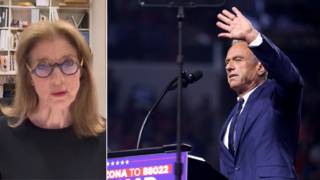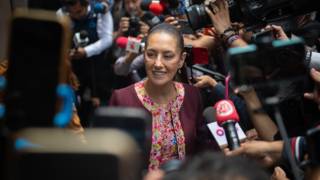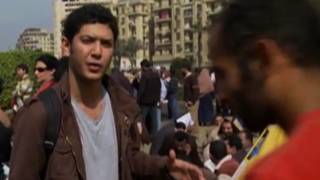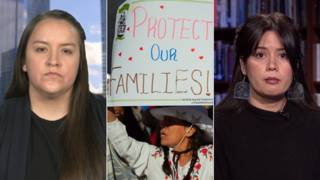
Related
Topics
Guests
- Sharif Abdel KouddousDemocracy Now! correspondent, reporting from the Egyptian city of Port Said.
Ongoing mass protests have led the Egyptian government to declare a state of emergency and the country’s defense minister to warn of the potential “collapse of the state.” We go to Democracy Now! correspondent Sharif Abdel Kouddous in the city of Port Said, where thousands have filled the streets in defiance of a nighttime curfew. “[Egyptian President Mohamed] Morsi is trying to do what Mubarak did for so many years: trying to use the police on the streets to solve his political problems,” Kouddous says. “Right now, Egypt is ungovernable.” [includes rush transcript]
Transcript
NERMEEN SHAIKH: We begin today’s show in Egypt, where mass protests have continued since they began last Friday on the anniversary of Egypt’s revolution. Now Egypt’s defense minister is warning of the potential, quote, “collapse of the state.” General Abdel Fattah al-Sisi posted the comment on a Facebook page after military forces were deployed in three cites along the Suez Canal, where a month-long state of emergency has been declared. In recent nights, thousands have filled the streets of Port Said along the northern tip of the canal in defiance of a night-time curfew imposed by President Mohamed Morsi.
SUEZ RESIDENT: [translated] I’m against these decisions. It will destroy people’s incomes. Why does he implement these measures here in Suez? Why doesn’t he take the same measures in Cairo and Alexandria? Is he angry at the residents of Suez, Ismailia and Port Said? Of course this is a disaster. It will devastate Suez. We are against his decisions. And if he runs again as a candidate, we will not elect him again, and we will ignore him.
AMY GOODMAN: Meanwhile, clashes have also erupted in Cairo, including an attack on an upscale hotel that drew response from the Egyptian special forces. More than 50 people have died in the country’s protests. Some of the violence was sparked by death sentences handed down Saturday for 21 soccer fans involved in riots that left 74 people dead last February. Protesters have also accused President Morsi of betraying the two-year-old revolution. All of this comes as the value of the Egyptian currency has plummeted to record lows, causing a spike in the prices of basic goods like sugar, rice and cooking oil.
Well, for more, we go to Port Said, where people continue to protest in defiance of a state of emergency. And we’re joined by Democracy Now!’s Sharif Abdel Kouddous, who is in Port Said.
Sharif, tell us what’s happening, and place Port Said in Egypt for us.
SHARIF ABDEL KOUDDOUS: Hi, Amy. It’s good to be with you.
Port Said is a city that is on the Suez Canal and on the Mediterranean. It’s at the mouth of the Suez Canal that attaches to the Mediterranean. And it’s a city that has had a long history of resistance. When Gamal Abdel Nasser nationalized the Suez Canal in the ’50s and Egypt came under attack by France, Britain and Israel, Port Said was a central target. And the attack and the resistance against it here is a source of local national pride in the collective memory of residents here. And it is that—that culture of resistance that has exploded on the streets here.
What happened really on Saturday was a massacre of over 30 people who were outraged by a death sentence of 21 of their local football team fans, soccer team fans, for a case that’s been going on for more than a year now. There were many of the families of those who—of the defendants around the jail. And once the shocking verdict came out, 21 death sentences handed down, you could hear the wails and screams of people in the streets. They approached the prison, and the police opened fire. And just that first day, 30 people were killed, including two police officers. That death toll—the next day, they went out in a funeral the following day, on Sunday; seven more people were killed when that funeral came under attack from police on rooftops. Nearly all of these people were killed with live ammunition. The death toll now is somewhere at 40. And this is a part—just a part of what’s happening in Egypt overall.
As you mentioned, there is a revolt. Egypt is undergoing a revolt right now that began on the second anniversary of its revolution, that has—we’ve seen protests and clashes in the capital, in Cairo, that are still going on, in Alexandra, in Mahalla and cities across the Delta. Something like 10 provinces are in revolt right now. And the president, Mohamed Morsi, in a bid to quell what was going on, finally made a speech. But in that speech, a very—with a very angry tone, a finger-wagging speech, he imposed a state of emergency for 30 days in these three cities that lie along the Suez Canal, which are the most restive cities right now. As opposed to Cairo kind of leading this revolt, it’s actually really in Suez, Ismailia and Port Said where you’re seeing kind of the most resistance. And he also imposed nighttime curfew and fines of that curfew. The curfew is supposed to be from 9 p.m. to 6 a.m. Thousands of people in all three of these cities began marches at 8:45 p.m. to tell Morsi that they won’t abide by this curfew, that they won’t abide by his governance. And so, he is facing a very serious crisis of legitimacy right now. The police have lost control of these cities. The army has been deployed, but largely is guarding state institutions that have to do with the Suez Canal. So, it’s a very significant and pivotal moment in Egypt.
NERMEEN SHAIKH: Sharif, can you explain what the implications are of the declaration of the state of emergency? And since, as you point out, thousands have defied the order, what kinds of consequences are they likely to face? What does a state of emergency entail?
SHARIF ABDEL KOUDDOUS: Well, the state of the emergency was one of the most despised tools of the Mubarak regime to suppress dissent, and it was a feature in Egypt for 30 years, from October 6, 1981, until March 12th, 2012, when it expired. Its lifting of the state of emergency was a principal demand of the revolution. And what it does is that it essentially lifts from judicial—you’re allowed to imprison people without judicial review, and it gives the police widespread powers. And there’s also been a law passed which allows the military to arrest citizens, gives them policing powers, and it would mean that those citizens would be put before military trials. So, this is a very—just the fact that Morsi, who before pledged never to have another state of emergency, the word “state of emergency,” which is such a despised tool of the Mubarak regime, is now being instilled again, I think resonated very harshly with many people.
To be honest, you know, the fact on the ground is, there has been little reform whatsoever, actually no reform of the police forces since the revolution over these two years. This is, you know, a force that has—that sees citizens as enemies and that—and by some accounts, has engaged in more killing and more torture than before the revolution, because now citizens, when they are facing abuse, no longer are quiet about it and take to the streets in protest. And so there’s a growing battle with this internal militia of repression that is this police force, that has not been resolved in any way whatsoever. There has been no accountability whatsoever for the over a thousand people who have been killed since the revolution. And so, this is—this is an inevitable outgrowth, this kind of revolt on the streets. And Morsi is trying to do what Mubarak did for so many years: trying to use the police on the streets to solve his political problems. And right now, you know, Egypt is ungovernable, by Morsi or perhaps by, you know, anyone else. There’s a serious crisis of legitimacy of the government.
AMY GOODMAN: Sharif, do you agree with Egypt’s top military officer, General Abdel Fattah al-Sisi, who is saying that Egypt could potentially collapse? He’s warning of collapse of the state.
SHARIF ABDEL KOUDDOUS: I mean, it’s hard to tell. You know, we’ve seen throughout these two years uprisings that come and go, these clashes that happen on the streets. And there’s really no real solution or political solution. The entire political class has failed to come together to forge a path with consensus to have some real change and some real reform in Egypt. And so, if we carry on on this path of just [inaudible] over problems, then the [inaudible] you know, there is this serious threat that cities like Port Said no longer recognize the legitimacy of the government, cities like Suez and cities like Cairo and Alexandria and elsewhere, that people do not—they feel completely disenfranchised by the political process.
And I’m not only talking about Morsi and the Muslim Brotherhood, but also Mohamed ElBaradei and Amr Moussa and Hamdeen Sabahi, the three main figures which make up the National Salvation Front, which is a loose alliance of non-Islamist opporition groups. They have performed very poorly, have really acted in a way that is crass and seems politically opportunistic, especially since this last crisis broke out. So, you know, the natural response is for people to vent their rage on the streets, this ongoing feud with the police. So, you know, we’ll—
AMY GOODMAN: Sharif, we’re going to leave it there, because your voice is breaking up a bit, though we’re really thrilled we were able to speak to you outside of Cairo, speaking to you in the northern coastal city of Port Said, where a great deal of the protest is taking place. Democracy Now!’s Sharif Abdel Kouddous, speaking to us from Port Said. We will link your article at TheNation.com.
This is Democracy Now! When we come back, the only person to go to jail around the torture program. He was the whistleblower on torture. Stay with us.












Media Options